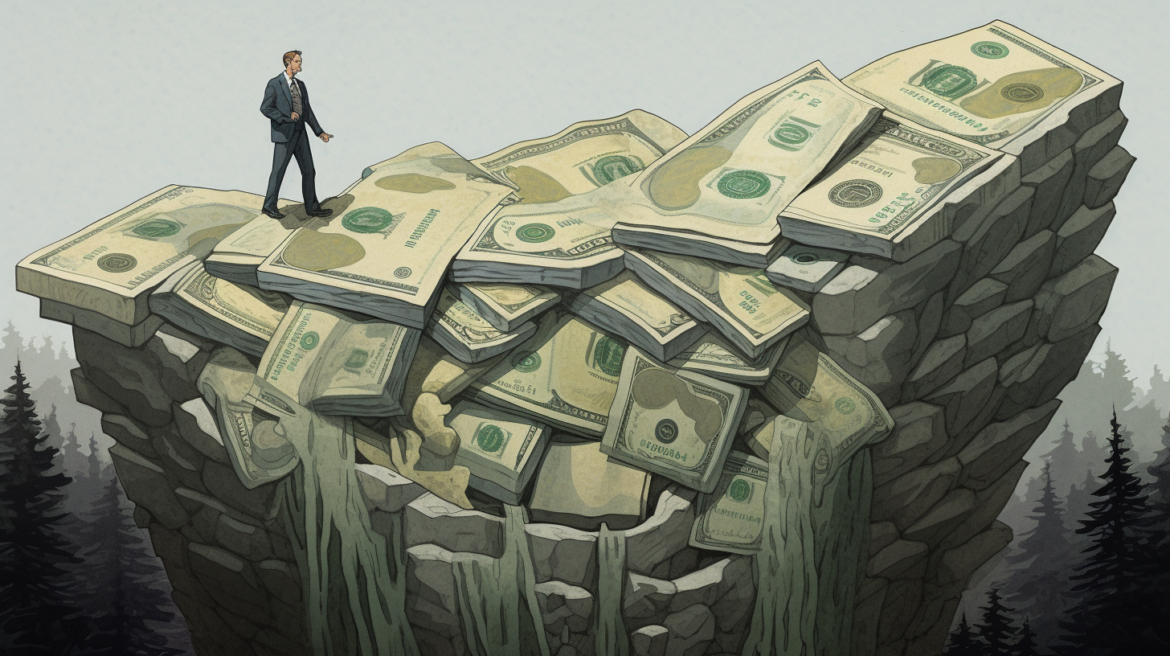Precious metals are apparently waking up. And here is where you can find the best deals.
Site:
Precious metals news
Physically-backed gold exchange-traded funds (ETFs) play a significant role in the gold market, attracting both institutional and individual investors who incorporate them into diversified investment portfolios. With data on over 100 physically-backed gold ETFs globally, the World Gold Council is back with some detailed analysis on what you should know before you invest in one.
The Bible features more than 700 references to gold and silver, emphasizing their timeless significance. The term ‘gold' alone appears in 47 of the 66 books of the Bible.Beyond their current cultural relevance, these precious metals play a crucial role in scripture, highlighting three key attributes: their divine origin, intrinsic value, and monetary quality.
Zimbabwe is exploring the option of backing its currency with gold to stabilize its exchange rate, according to Finance Minister Mthuli Ncube. This announcement comes as part of efforts to address the ongoing instability of the Zimbabwe dollar, which has struggled since its reintroduction in 2019 after a period of hyperinflation. President Emmerson Mnangagwa also indicated plans for a "structured currency" to overhaul the current system. Despite previous attempts, including the introduction of gold coins and digital tokens, to support the currency, the Zimbabwe dollar continues to perform poorly. These efforts have faced criticism from the International Monetary Fund, which has questioned the unconventional methods employed by Zimbabwe to improve its currency's value.
In the Year of the Dragon, historically known for bringing prosperity and strength, the U.S. stock market is anticipated to continue its upward trajectory, according to Tom Lee of Fundstrat Global Advisors. Analysis of market performance since 1871 shows that during Dragon years, U.S. equities have seen an average gain of 12.7%. For 2024, the Year of the Dragon, which starts on February 10, Lee predicts the S&P 500 could rise to as high as 5,350 points, marking a 6.4% increase from its recent closing.
 Record Gold Buying by Central Banks Expected to Continue, According to TDS
Record Gold Buying by Central Banks Expected to Continue, According to TDSFeb 12, 2024 - 06:45:26 PST
In recent years, central banks across the globe have significantly increased their gold acquisitions, with purchases surpassing 1,000 tonnes annually in both 2022 and 2023. TD Securities analysts forecast this upward trend in gold buying to persist, driven by a growing consensus among central banks regarding a potential decline in the dominance of the US Dollar in the future. This shift in perspective, highlighted by recent surveys indicating a rise in skepticism towards the dollar's prevailing role, is expected to be a major catalyst for sustained gold demand. This insight underscores the strategic move by central banks to diversify their reserves amidst evolving economic forecasts.
 Currency Watch: Dollar Rises, Eyes Set on Upcoming U.S. Inflation Insights
Currency Watch: Dollar Rises, Eyes Set on Upcoming U.S. Inflation InsightsFeb 12, 2024 - 06:21:52 PST
The dollar saw a slight increase as many Asian markets were closed for a holiday, setting the stage for a potentially eventful week focused on U.S. inflation data. This data is crucial because it could hint at when the Federal Reserve might begin reducing interest rates. The euro fell slightly, while the pound also dropped. In contrast, the Japanese yen gained a bit of strength. The financial world is closely watching changes in central banks' interest rate plans, especially with recent strong job data suggesting the Fed might not cut rates until possibly May.
 Wind Power Provides BIG CHUNK of Texas Electricity Power Generation This Past Week
Wind Power Provides BIG CHUNK of Texas Electricity Power Generation This Past WeekFebruary 11, 2024
While GREEN ENERGY is still plagued with many problems and issues, Wind Power provided a BIG CHUNK of Texas Electricity Supply this past week. Actually, I was quite stunned by the amount of wind power generation in the Texas ERCOT Grid this past week...
 Interest Rate Outlook: Fed Plans Cautious Cuts After Inflation Assessment
Interest Rate Outlook: Fed Plans Cautious Cuts After Inflation AssessmentFeb 9, 2024 - 11:08:05 PST
The Federal Reserve has been increasing the federal funds rate to fight inflation, with 11 hikes from March 2022 to July 2023. Although prices are beginning to decrease, the Fed is waiting for more solid data before making any rate cuts. In its first 2024 meeting, the Federal Open Market Committee (FOMC) kept interest rates stable at 5.25 to 5.5%, marking the highest rate in over 20 years. There are seven more meetings scheduled for the year where rate cuts could be considered, with the next one on March 19 and 20. This shows that while rate cuts are anticipated, they won't happen until at least spring, as the Fed carefully watches inflation trends.
 Government Says, Inflation in December Was Even Lower Than First Reported
Government Says, Inflation in December Was Even Lower Than First ReportedFeb 9, 2024 - 10:21:30 PST
The U.S. government has announced that inflation in December was even lower than initially reported. The revised data shows that prices for a wide range of goods and services rose by 0.2% for the month, which is lower than the first estimate of 0.3%. This slight adjustment indicates that inflation was cooling down as 2023 began, potentially giving the Federal Reserve more room to reduce interest rates later in the year.
In this week's Friday Gold Wrap Podcast, JD and Joel discuss why gold is down this week, Powell's comments on 60 Minutes about the debt, and some Valentine's Day thoughts inspired by Austrian economist Carl Menger.
Nvidia has seen its value skyrocket, reaching a point where it's now equivalent to the entire value of the Chinese stock market. Over the past year, Nvidia's value has jumped by 228%, contrasting sharply with the 26% drop in the Hang Seng Index, which tracks the Hong Kong stock market, primarily fueled by their dominance in the A.I. industry.
 Oil Prices Spike as US Inflation Concerns Ease and Geopolitical Tensions Rise
Oil Prices Spike as US Inflation Concerns Ease and Geopolitical Tensions RiseFeb 9, 2024 - 08:57:35 PST
Oil prices surged as recent US data revisions indicated that inflation pressures are decreasing, sparking optimism that the Federal Reserve may lower interest rates later this year. The price of West Texas Intermediate oil climbed above $77 a barrel, driven by a mix of factors including the S&P 500 hitting new highs, increased geopolitical risks, and technical trading patterns. Additionally, shipping companies have raised alarms about worsening security in the Red Sea. The combination of these factors, along with tighter fuel markets as shown by rising refining margins, has contributed to oil's price rise.
 Gold Price Forecast: CommerzBank Says Gold Unlikely To Leave its Trading Range
Gold Price Forecast: CommerzBank Says Gold Unlikely To Leave its Trading RangeFeb 9, 2024 - 08:32:44 PST
Analysts at Commerzbank are not optimistic about a sudden shift towards rapid interest rate cuts, even if the inflation data comes in lower than expected. They believe that without a significant surprise in the inflation figures, gold is unlikely to break out of its current trading range, which lies between slightly over $2,050 and $2,000.
Going to the SuperBowl has never been cheap. But this year, as the Kansas City Chiefs face off against the San Francisco 49ers in Las Vegas for Super Bowl 58, the ticket prices have hit the roof, making it the priciest Super Bowl ever. Tickets are being sold for between $5,300 and $107,000 on Stubhub, with the average cost around $9,500. Compared to last year's game, ticket prices have shot up by 93%, and over the last decade, they've increased by 300%.
Turkey continued its trend of investing heavily in gold in January, purchasing 23 tonnes and maintaining its position as the world's leading gold buyer among central banks for that period. This recent purchase has brought Turkey's gold reserves to an all-time high of 565 tonnes. Globally, central banks have increased their gold reserves by a net total of 31 tonnes in January, marking a 16% rise from December's figures. Following Turkey, the People’s Bank of China and the National Bank of Kazakhstan were significant buyers, adding 15 tonnes and 4 tonnes to their gold reserves, respectively.
Speaking to the Investing News Network, Joe Cavatoni, market strategist at the World Gold Council, reminded investors that it's important to hold the yellow metal during tough times.
U.S. weekly jobless claims have dipped, showcasing the labor market's robustness even as the tech sector announces significant layoffs. Last week saw a decrease of 9,000 in jobless claims, settling at 218,000, against a backdrop of anticipated layoffs predominantly in the technology industry. This development suggests not only the absence of widespread job losses but also a strong economic growth momentum carrying into early 2024, potentially impacting the Federal Reserve's interest rate decisions.
Global creditors engaged with major ratings agencies such as Moody's, Fitch, and S&P Global Ratings to discuss the impact of debt relief provided to some of the world's poorest nations. The focus was on how these actions affect credit ratings, particularly in light of the Debt Service Suspension Initiative (DSSI) which has been crucial since the COVID-19 pandemic. Countries seeking relief faced increased borrowing costs due to downgrade warnings, highlighting the need for a balanced approach to sovereign debt distress.
Companies around the world are starting to buy back their own shares at a fast pace as 2024 begins, thanks to strong earnings that were better than many expected. After being cautious with their money in 2023 due to high borrowing costs, businesses are now expected to increase their share buybacks this year. In the United States alone, companies have announced plans to buy back $105 billion of their own shares just in the first week of February, a record start to the year. This is seen as a big support for stock markets, which are already hitting new highs, with the S&P 500 Index reaching new records nine times this year.
Jerome Powell's 60 Minutes portrayal of the national debt crisis as a distant concern starkly contrasts with the urgent reality we face. Peter Schiff doesn't mince words in his most recent podcast when he highlights the immediate threat:







